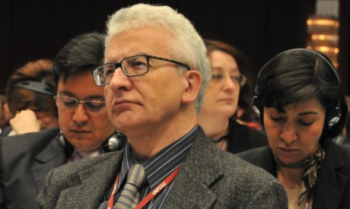By Guy Edwards*
 Fernando Tudela Abad, one of Mexico’s foremost climate change experts and undersecretary of environmental policy and planning at the Ministry of the Environment and Natural Resources, attends a session at COP17 in Durban, South Africa. Photo: Guy EdwardsDuring the COP17 in Durban I caught up with Fernando Tudela Abad, one of Mexico’s foremost climate change experts and a high ranking official of the Mexican delegation. Tudela is undersecretary of environmental policy and planning at the Ministry of the Environment and Natural Resources and also chairs the expert group of the Organisation for Economic Co-operation and Development (OECD) on climate change.
Fernando Tudela Abad, one of Mexico’s foremost climate change experts and undersecretary of environmental policy and planning at the Ministry of the Environment and Natural Resources, attends a session at COP17 in Durban, South Africa. Photo: Guy EdwardsDuring the COP17 in Durban I caught up with Fernando Tudela Abad, one of Mexico’s foremost climate change experts and a high ranking official of the Mexican delegation. Tudela is undersecretary of environmental policy and planning at the Ministry of the Environment and Natural Resources and also chairs the expert group of the Organisation for Economic Co-operation and Development (OECD) on climate change.
Tudela explained how Mexico’s active involvement in the climate negotiations is based on national concerns over the country’s considerable vulnerability to climate-related disasters. In 2010, Mexico’s Foreign Secretary Patricia Espinoza remarked before the COP16 in Cancun, “we estimate that 15 percent of our national territory, 68 percent of our population and 71 percent of our GDP is highly exposed to the impacts of climate change.”
Last year Mexico faced its worst drought in 70 years with the lack of rainfall affecting almost 70 percent of the country. Entire crops covering tens of thousands of acres were lost and over 400,000 cattle perished in arid pastures.
As the first heavily-populated oil-exporting country to ratify the Kyoto Protocol, Mexico has a long history in the international climate change negotiations and strongly emphasizes the importance of multilateralism. The country’s efforts at the COP16 in Cancun, which successfully resuscitated the U.N. Framework Convention on Climate Change (UNFCCC) process following the bungled COP15 in Copenhagen, are generally recognized as a diplomatic triumph.
Tudela also commented that Mexico views climate change as an incentive to advance sustainability. The delegation is committed to helping the country move towards a low carbon resilient economy, a shift in thinking partially based on the government’s endorsement of the study The Economics of Climate Change in Mexico.
The study states that climate change has and will continue to have significant impacts on the Mexican economy and details impacts on a variety of sectors including agriculture, tourism, infrastructure and public health.
SAVINGS BY ACTING NOW
The report states that the total costs of climate change by the year 2100 are expected to be the equivalent of around 6.2 percent of Mexican GDP, excluding livestock production, extreme weather events, sea level rise and nonmarket costs in terms of biodiversity and human lives.
The costs of mitigating emissions by 50 percent by the year 2100, relative to 2002, are between 0.7 percent and 2.2 percent of GDP, figures that make a very strong case on why inaction could prove so detrimental.
Tudela also highlighted the importance of every country doing its best to work towards securing a successful outcome at the UNFCCC talks, while also being ambitious at the national level. Even though Mexico’s developing country status precludes it from legal commitments under the Kyoto Protocol, its Special Program on Climate 2009-2012 sets out an aspirational target to reduce national GHG emissions 50 percent by 2050 with year 2000 emissions as the baseline.
However, the Program states that this target will only be met if developed countries provide unprecedented levels of financial and technological support under a multilateral regime.
Mexico’s desire to be a leader in green growth saw its Ministry of the Environment and Natural Resources sign a cooperation agreement in September 2011 with the U.N. Environment Programme (UNEP), which will assist in creating and operating a new Mexican Center for Sustainable Development. The Center will aim to become a regional hub for the region, fostering cooperation on low-carbon growth and green economy issues.
In the chaotic corridors and meeting rooms of the COP17, Tudela’s thoughtful and softly spoken comments are emblematic of a country quietly “getting on with it”. As we wrapped up the interview it seemed more likely that the overall goals of the UNFCCC could be met if more countries like Mexico brought positive experiences and pragmatic attitudes to the table.
* Guy Edwards, who is based in Ecuador, is a research fellow at Brown University’s Center for Environmental Studies and works with the Latin American Platform on Climate and the Climate and Development Knowledge Network. This blog first appeared on Intercambio Climatico.
Taken from http://www.trust.org/alertnet/

